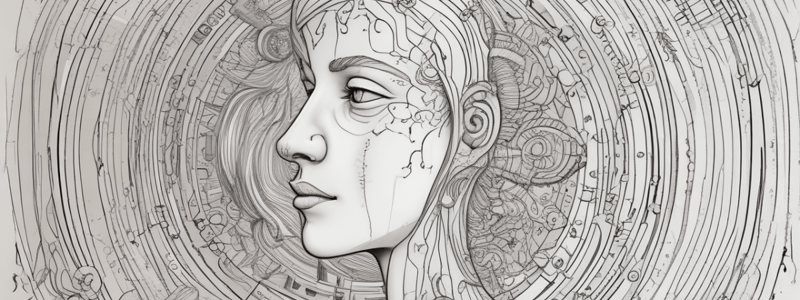Podcast
Questions and Answers
What is the primary function of attention in cognitive processes?
What is the primary function of attention in cognitive processes?
- To automatically ignore all sensory input.
- To selectively focus on specific stimuli. (correct)
- To respond to all stimuli equally.
- To memorize all stimuli encountered.
Which type of attention is essential for activities requiring prolonged concentration?
Which type of attention is essential for activities requiring prolonged concentration?
- Divided attention
- Sustained attention (correct)
- Executive attention
- Selective attention
Which factors can influence sustained attention?
Which factors can influence sustained attention?
- Age and intelligence
- Fatigue, motivation, and environment (correct)
- Technological devices and distractions
- Gender and cultural background
What does selective attention primarily involve?
What does selective attention primarily involve?
How does sustained attention differ from selective attention?
How does sustained attention differ from selective attention?
Which of the following is NOT a type of attention mentioned?
Which of the following is NOT a type of attention mentioned?
What is the primary difference between divided attention and concentration?
What is the primary difference between divided attention and concentration?
How do physical factors influence attention according to the content?
How do physical factors influence attention according to the content?
What role do motives play in shaping attention?
What role do motives play in shaping attention?
What happens during a meeting when a person utilizes concentration?
What happens during a meeting when a person utilizes concentration?
What effect does multitasking have on task performance?
What effect does multitasking have on task performance?
What distinguishes executive attention from other types of attention?
What distinguishes executive attention from other types of attention?
In what way is concentration different from attention?
In what way is concentration different from attention?
Which practice is cited as a method to improve both attention and concentration?
Which practice is cited as a method to improve both attention and concentration?
What can negatively impact a person's ability to concentrate?
What can negatively impact a person's ability to concentrate?
Flashcards are hidden until you start studying
Study Notes
Attention and Its Types
- Attention is the cognitive ability to focus on a specific stimulus amid numerous competing stimuli.
- Essential for filtering out excess information in environments like busy city streets or crowded settings.
Types of Attention
-
Sustained Attention
- Ability to maintain prolonged concentration on a task without distractions.
- Vital for activities like reading and complex problem-solving.
- Influenced by factors such as fatigue, motivation, and environment.
-
Selective Attention
- Involves filtering to focus on specific items while ignoring others.
- Requires tuning out both external stimuli and internal distractions like thoughts and emotions.
- Illustrates the concept that attention is selective and involves exclusion to manage multiple possible inputs effectively.
-
Divided Attention
- Involves multitasking, attending to multiple stimuli simultaneously.
- Can be overt (shifting focus with eye movement) or covert (not moving eyes while shifting attention).
- A combination of overt and covert attention occurs when maintaining focus on one object while being aware of others nearby.
-
Executive Attention
- Involves management of higher cognitive processes such as planning, decision-making, and problem-solving.
- Critical for regulating behavior according to set objectives and goals.
Concentration
- Concentration refers to maintaining high attention on a specific task for an extended duration.
- Linked closely to attention; good attention enhances deep concentration.
- Factors affecting concentration include the environment, motivation, and fatigue.
Strategies for Improving Attention and Concentration
- Practices such as meditation, time management, and mindful pausing can enhance both attention and concentration.
Examples Illustrating Differences Between Attention Types
-
Reading a Book
- Sustained Attention allows engagement with the story, while Concentration leads to deep immersion and time loss.
-
Meeting
- Selective Attention enables focus on the presenter amidst noise; Concentration helps actively participate in discussions.
-
Multitasking
- Divided Attention occurs when juggling tasks like emails and meetings, potentially compromising quality; Concentration focuses solely on one task for optimal results.
-
Problem Solving
- Executive Attention organizes strategies for problem-solving; Concentration is necessary for deep involvement in tackling challenges.
Determinants of Attention
-
Physical Factors
- Characteristics like brightness, size, and contrast can capture our attention, e.g., brightly packaged products.
-
Motives
- Individual motives influence what captures attention, such as food-related stimuli becoming more prominent when hungry.
Understanding Selective Attention
- Early studies confirmed selective attention's role in processing incoming information, leading to focused perception of stimuli deemed significant.
Studying That Suits You
Use AI to generate personalized quizzes and flashcards to suit your learning preferences.




